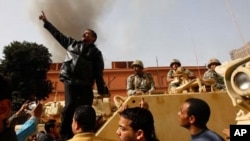The close relationship between the U.S. and Egyptian militaries might be important in helping to determine the outcome of the current unrest.
When the demonstrations in Egypt began last week, the second-ranking Egyptian military officer was in Washington for a week of meetings with senior American officers. Lieutenant General Sami Anan cut his visit short and returned home on Friday.
But not long after he arrived in Egypt, Anan received a telephone call from the top U.S. military officer, Admiral Michael Mullen, who, a spokesman says, “expressed his appreciation for the continued professionalism of the Egyptian military.” The spokesman says the two officers reaffirmed their desire for the U.S.-Egypt military “partnership” to continue, and pledged to stay in touch.
It seems like a routine news release, but in the context of the growing demonstrations against the Egyptian government and the army’s presence on the country's streets, analysts say it was evidence of an important 'back channel' in U.S.-Egypt communications.
It is the kind of channel very familiar to retired U.S. Army Lieutenant General James Dubik, who is now a senior fellow at the Washington-based Institute for the Study of War. “Relationships often are important in the discussions or negotiations between nations where the formal conduits may, for whatever reason, be less helpful," he said.
General Dubik did not deal much with Egyptian officers during his military career, but he was a senior commander at the U.S. Army’s Training and Doctrine Command and later moved to Baghdad to lead the U.S. effort to train Iraq’s new army. He says formal training is important for things like combat skills and tactics. But he says informal contacts - in the hallways and during meals - convey a different kind of training. “It centers around subordination of the military to civil control. It also discusses the military’s responsibility to protect the citizens of the nation," he said.
Egyptian soldiers might have to decide between those are two concepts in the coming days, if the government orders a crackdown on demonstrators. “Those kind of decisions are very, very difficult. Very difficult. You know, that’s just not a comfortable position, not one that you search for, and not one that in advance you really have an answer [for] until you face it," he said.
It is a well known dilemma, faced by troops in many countries over the years, with varying results. Among them, the Philippine revolution in 1986, when troops did not fire on the people, and the crackdown on the Tiananmen democracy movement in China in 1989, when troops did fire.
In the current situation, Washington-based Egyptian political commentator Tawfik Hamid of the Potomac Institute says if Egyptian soldiers are faced with that dilemma, they will choose not fire on the people, and will defy their longtime leader, President Hosni Mubarak. “I don’t think they will turn their weapons against the Egyptian people at the end. I believe it will be much easier for them to remove Mubarak as one single individual, [and] look like the heroes who removed Mubarak. Killing tens of thousands will turn it into real hell, real hell if this happens," he said.
Hamid is a physician who spent two years in the Egyptian Army as a young man and later became an Islamic militant for a time. He says Egyptians do not like their police force because its officers deal with local issues, often harshly. But he says the people respect the military, which usually does not deal with Egyptians directly, and is seen as their protector against external threats.
He says many soldiers at all levels have been unhappy with the state of the country for a long time. “They are part of the society itself. And many of them were very angry about what’s happening in the country for ages," he said.
Dr. Hamid says U.S. leaders should not worry about a change of leadership in Egypt. He says there are many civilian officials and military officers who would be acceptable to the demonstrators and supportive of U.S. policies in the Middle East. But he says the Egyptian people will accept that only if the United States is seen as helping with President Mubarak’s ouster, rather than trying to prevent it.
“The military always want to know Washington’s direction. They know that they can not do things unless they got some 'green light.' If the United States sends them a message that they will be behind them and will support the country under their control if they get rid of Mubarak, this can really help in solving the problem relatively fast," he said.
Although Secretary of State Hillary Clinton has called for an “orderly transition” in Egypt, she and other U.S. officials have stopped short of calling for President Mubarak’s departure. And there is no indication that U.S. defense officials or military officers have done so. In addition to the telephone call between Admiral Mullen and General Anan, Defense Secretary Robert Gates called his Egyptian counterpart over the weekend.
Pentagon spokesman Colonel David Lapan said, “It’ll be situational. When there is a need to reach out and have contact, that will happen. It’s just a matter on whether there’s a need for direct conversation between any of the senior leaders or not, and each of those individuals will judge that based on the circumstances.”
Officials say the emphasis in the private conversations has been on repeating public calls for restraint, and stressing that in spite of the extensive relationship and considerable U.S. influence, the outcome of the demonstrations, and Egypt’s future, should be decided by Egyptians.








